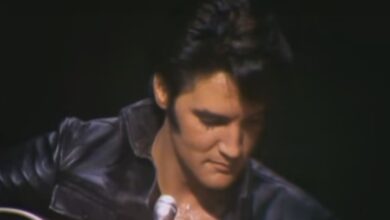50 Years Ago, Saw Elvis Movie on First Date and Heard His Greatest Song
Elvis Presley’s recording of “Marguerita” in 1963 stands as a notable entry in his prolific career, showcasing his versatility and continued evolution as a musical artist. Released during a period when Presley was exploring various musical styles beyond his rock and roll roots, “Marguerita” reflects his ability to embrace diverse genres and experiment with different sounds.
The song itself carries a lively, Latin-inspired rhythm, infused with elements of pop and exuding a sense of playful charm. Presley’s charismatic vocal delivery adds to the song’s infectious energy, capturing the listener’s attention with its upbeat tempo and catchy melodies.
Recorded at a time when Presley was also venturing into acting roles in Hollywood films, “Marguerita” served as a reflection of his cinematic persona. His on-screen charisma often translated seamlessly into his musical performances, creating a cohesive image that resonated with audiences both on screen and through his recordings.
Presley’s interpretation of “Marguerita” underscores his ability to connect with diverse musical influences while maintaining his distinctive vocal style. The song’s arrangement, featuring vibrant instrumentation and a lively beat, complements Presley’s dynamic vocals, highlighting his command over different musical genres beyond his rockabilly origins.
Throughout his career, Elvis Presley’s impact on popular music and culture was profound, earning him a place among the most influential artists of the 20th century. From his early rock and roll hits to his ventures into gospel, blues, and ballads, Presley’s versatility allowed him to appeal to a wide audience and maintain relevance across decades.
Born in 1935 in Tupelo, Mississippi, Elvis Aaron Presley began his musical journey at an early age, influenced by the gospel music he heard in church and the blues and country sounds of the South. His breakthrough came in the mid-1950s with hits like “Heartbreak Hotel,” “Hound Dog,” and “Love Me Tender,” which catapulted him to international fame and established him as a cultural icon.
Beyond his musical achievements, Presley’s impact extended into film, where he starred in a series of successful movies throughout the 1960s. His film career allowed him to explore different facets of his persona and showcase his acting abilities alongside his musical talents.
In the context of “Marguerita,” Elvis Presley’s recording stands as a testament to his enduring appeal and willingness to explore new musical territories. The song’s blend of Latin rhythms and pop sensibilities reflects a period of experimentation and innovation in Presley’s career, demonstrating his ability to adapt and evolve while staying true to his musical roots.
Presley’s legacy continues to resonate today, influencing generations of musicians and fans alike. His catalog of recordings, including “Marguerita,” remains a cherished part of popular music history, celebrating his artistic legacy and ongoing impact on the entertainment industry.



